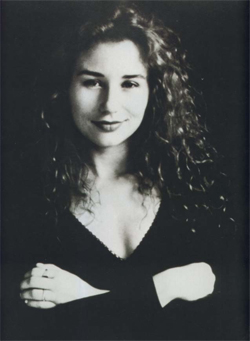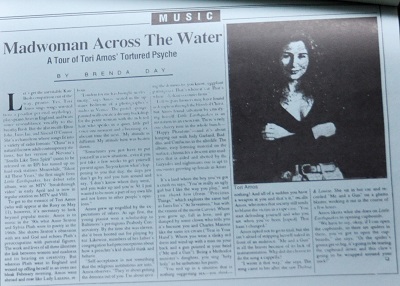|

songs | interviews | photos | tours | boots | press releases | timeline
The Village View (US)
Los Angeles, California
May 8, 1992

Madwoman Across The Water
A Tour of Tori Amos' Tortured Psyche
By Brenda Day
Let's get the inevitable Kate Bush comparison out of the way, pronto. Yes, Tori Amos sings songs wrested from a peculiar personal mythology, plays piano, lived in England, and bears some resemblance vocally to the breathy Bush. But she also recalls Elton John, Janis Ian, and Sinead O'Sonnor. She's a chameleon whose songs fit into a variety of radio formats: "China" is a natural for new aduly contemporary stations, but her version of Nirvana's "Smells Like Teen Spirit" (soon to be released on an EP) has turned up on hard rock stations. Meanwhile, "Silent All These Years," the first single from Little Earthquakes, her debut solo album, was an MTV "breakthrough video" in early April and is now in regular rotation on MTV and VH1.
To get to the essence of Tori Amos (who will appear at the Roxy on May 11), however, it's necessary to look beyond popular music. Amos is to music in the '90s what Anne Sexton and Sylvia Plath were to poetry in the 1960s. She shares Sexton's obsession with sex and God and echoes Plath's preoccupation with parental figures. The work and lives of all three illustrate the link between women and madness and its bearing on creativity. But whereas Plath went to England and would up offing herself in an oven one bleak February morning, Amos went abroad and rose like Lady Lazarus, reborn.
"London for me has brought an electricity," says Amos, seated in the upstairs bedroom of a photographer's studio in Venice. The pastel sponge painted walls create a dreamy backdrop for the petite woman with the rich red hair who speaks in a quiet, little girl voice one moment and a booming, exuberant tone the next. "My attitude is different. My attitude here was beaten down.
"Sometimes you just have to put yourself in a new situation... even if you just take a few weeks to get yourself present again. So you know what's happening to you that day, the days just don't go by and you turn around and say, 'I don't know where they went,' and you wake up and you're 30. I just wanted to be more a part of my own life and not listen to other people's opinions."
Amos grew up engulfed by the expectations of others. At age five, the young pianist won a scholarship to Baltimore's prestigious Peabody Conservatory. By the time she was eleven, she'd been booted out for playing by ear. Likewise, members of her father's congregation had preconceptions about how a preacher's kid should think and behave.
"Self-acceptance is not something that the religious institutions are into," Amos observes. "They're about getting the demons out of you. I'm about inviting the demons to, you know, eggplant parmigiana. That's where it's at. That's where wholeness comes from."
Fellow parishioners may have found redemption through the blood of Christ, but Amos found salvation by crucifying herself. Little Earthquakes is an invitation to an exorcism. There's only one cheery tune in the whole bunch -- "Happy Phantom" -- and it's about hanging out with Judy Garland, Buddha, and Confucius in the afterlife. The album, easy-listening material on the surface, chronicles a descent into madness that is aided and abetted by the fairytales and nightmares one is apt to encounter growing up female in America.
It's a land where the boy you've got a crush on says, "You're really an ugly girl but I like the way you play," and you thank him (from "Precious Things," which explored the same turf as Janis Ian's "At Seventeen," but with the venom of the movie Carrie). Where you grow up, fall in love, and get dumped by some clown who tells you it's because you and Charles Manson like the same ice cream ("Tear in Your Hand"). Where you wear a slinky red dress and wind up with a man on your back and a gun pointed at your head ("Me and a Gun"). Being a Methodist minister's daughter, you sing "holy holy" as be unbottons his pants.
"You end up in a situation that is nothing suggesting sex -- you think -- nothing! And all of a sudden you have a weapon at you and that's it," recalls Amos, who notes that society still tends to blame the victim in a rape case. "You start defending yourself and who you are when you've been [raped]. That hasn't changed."
Amos opted not to go to trial, but she isn't afraid of stripping herself naked in front of an audience. "Me and a Gun" is all the braver because of its lack of instrumentation. Why did she choose to do the song a capella?
"I wrote it that way," she says. The song came to her after she say Thelma & Louise. She sat in her car and recorded "Me and a Gun" on a ghetto blaster, working it out in the course of a few hours.
Amos likens what she does on Little Earthquakes to opening cupboards.
"We have to say, okay, if I can open the cupboards, so there are spiders in there, you've got to open the cupboards," she says. "Or the spider's gonna get so big, it's going to be tearing the cupboard down and this claw's going to be wrapped around your neck!"
original article

t o r i p h o r i a
tori amos digital archive
yessaid.com
|